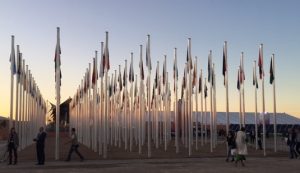
For the last two weeks, representatives of almost 200 countries have been in Marrakech for the 22nd Conference of the Parties (COP) to the United Nations Framework Convention on Climate Change, known as COP22. Coming into the conference, there were high hopes that it would be the “COP of Action,” with countries working to implement the Paris Agreement, reached at COP21 last year. Aimed at limit global warming to “well below” 2oC above pre-industrial levels, the Paris Agreement establishes an overarching framework for action to address climate change, but leaves much of the detail to be worked out through future negotiations. These negotiations began in May in Germany and continued in Morocco at COP22.
There was broad agreement, among country representatives at COP22, on the need to advance implementation of the Paris Agreement. Reaching consensus on how to do proved difficult, however. Discussions continued into the early hours of the morning for several days, finally wrapping up around 4am on Saturday, with the adoption of thirty-five decisions, establishing a detailed plan for moving forward to implement the Agreement. Most significantly, it was decided that all preparatory work for implementation should be completed by 2018, with a progress review in 2017. While that is longer than many had hoped, it bears remembering that completion of work to implement the Kyoto Protocol took four years. Whereas the Kyoto Protocol required only developed countries to take action to address climate change, the Paris Agreement requires action by developing countries as well.
To assist developing countries implement the Paris Agreement, developed countries agreed to provide at least $100 billion per year by 2020, to support their climate change mitigation and adaptation efforts. Many hoped that COP22 would result in a roadmap for delivering those funds. A key focus of the conference was on funding for adaptation, with countries discussing whether the Adaptation Fund serving the Kyoto Protocol should be continued under the Paris Agreement. Going into the final day of the conference, it looked as if a decision would be reached to continue the fund, to the delight of many developing countries. This was, however, strongly resisted by a number of developed countries. In the end, consensus could only be reached about the need to continue discussing the issue at future meetings.
Like discussions on the Adaptation Fund, most of the negotiations at COP22 did not result in substantive decisions, but merely an agreement to continue work. Most decisions are, therefore, largely procedural in nature. This has disappointed many environmentalists and others, who despair that COP22 did not turn out to be the COP of Action. While this is understandable, it is important to recognize the numerous achievements that were made, outside of the formal negotiations. These include:
- adoption of the Marrakech Action Proclamation, in which government leaders re-affirmed their commitment to “full implementation” of the Paris Agreement and called for “urgently raising ambition and strengthening cooperation amongst ourselves,” so as to “meet the [Agreement’s] long-term temperature goals;”
- release of the first long-term strategies for reducing climate-damaging greenhouse gas emissions in accordance with the Paris Agreement by:
- announcement of emissions reductions targets by 200 companies, including Walmart, Coca Cola, Mars, General Mills, Kellogg, and Sony, as part of the Science Based Targets initiative; and
- commitment of additional financial resources for emissions reductions and other climate actions, including by the World Bank, which pledged to double financing for climate action in the Middle East and North Africa to US$1.5 billion per year.
These are notable achievements and reflect a growing appreciation within the international community of the seriousness of climate change. Many governments, international organizations, and private-sector entities are clearly committed to doing what they can to address it. The world must go further, however. As U.S. Secretary of State John Kerry noted in his address at COP22, we must do whatever is required to mitigate further climate change, and adapt to that which has already occurred. Hopefully world leaders will remember that in future discussions.



